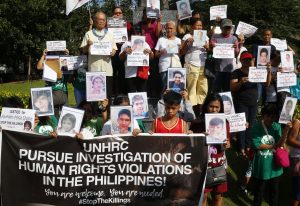The UN’s rights chief slammed Philippine President Rodrigo Duterte’s deadly war on drugs this week, adding to global calls for potential prosecution even as the Philippines vowed to establish an interagency panel to investigate drug war killings.
UN High Commissioner for Human Rights Michelle Bachelet, during the UN Human Rights Council’s 44th session on Tuesday, said the policy had created a cycle of “impunity” and is responsible for “systematic” violence leading to thousands of extrajudicial killings since Duterte launched the nationwide campaign after being elected in 2016.
The top UN rights body has previously criticized the drug war, and rights groups have called for an independent investigation into the killings. Philippine authorities say 5,665 people have died in the drug war, although the country’s rights commission has said that number could exceed 27,000.
In a report released Tuesday, the World Organization Against Torture concluded that at least 122 children have been killed during the drug war, including some who were deliberately targeted as proxies – deaths Philippine authorities have called “collateral damage.”
That report comes shortly after a Human Rights Watch report highlighted the physical and emotional trauma suffered by thousands of children who have lost family members to the drug war.
The Philippines under Duterte has resisted charges of human rights abuses despite widespread international condemnation of the drug war, crackdowns against journalists and activists, and a controversial anti-terrorism bill expected to become law next week.
Bachelet on Tuesday also urged Duterte to reconsider the anti-terror bill, which would give authorities widespread power to arrest government critics without warrants and detain them for up to 24 days without charges.
The bill “heightens our concerns on the blurring of important distinctions between criticism, criminality and terrorism,” Bachelet said. “I would urge the president to refrain from signing the law.”
Duterte has until July 9 to sign or reject the bill. Should he take no action, the bill will automatically become law.
Duterte took office in June 2016 after a presidential campaign in which he pledged to dump the bodies of drug dealers into Manila Bay; Philippine drug war casualties peaked in 2016 and 2017. The campaign continues to this day, even as much of the country remains under various states of community quarantine due to the ongoing COVID-19 pandemic.
Philippine Justice Secretary Menardo Guevarra said Tuesday the country had created an interagency body to probe the 5,655 drug war casualties claimed by the government.
The panel, he said, would determine if there is evidence to file charges against police officers alleged to be involved. At present, only one case, the killing of 17-year-old Kian delos Santos in August 2017, has led to the trial and conviction of police officers.
Guevarra said the panel would involve the country’s Commission on Human Rights as an “independent monitory body.” The rights commission has often found itself sidelined and subjected to attacks by the Duterte administration.
Human Rights Watch on Wednesday called the interagency panel “a ruse to shield the country from international scrutiny” and questioned its credibility.
“The panel is deeply flawed,” said Phil Robertson, deputy director of HRW’s Asia Division. “It will be led by the Department of Justice and will have among its members the very agencies – notably the police and the Philippine Drug Enforcement Agency – directly implicated in the ‘drug war.’”
The panel, he continued, is a “naked attempt” to discourage the UN Human Rights Council from launching an independent investigation into drug war killings.
Bachelet, the high commissioner, and 23 UN human rights experts have recommended that the Human Rights Council begin an investigation into the drug war campaign and other charges of human rights violations, including abuses against activists, journalists and Indigenous peoples.
China and Russia on Tuesday criticized the office’s report and called the findings “politicized.” Both countries have enjoyed warmer ties with the Philippines since Duterte took office.
Russia stated its belief that countries “must resolve human rights issues themselves,” while China said it had a “positive” view of the Philippines’ economic and social programs, including the drug war.
Duterte has previously criticized efforts by the UN to launch an investigation into the drug war. He also unilaterally canceled the Philippines’ membership in the International Criminal Court in 2018 after its prosecutor announced a preliminary investigation into drug war killings.

































